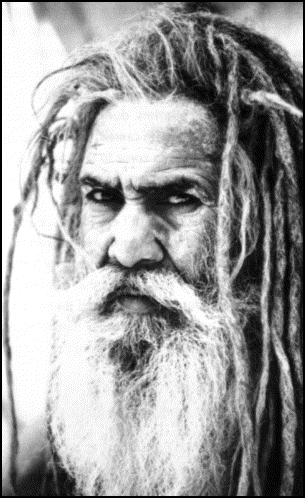Bringing the Deep Wisdom of
The Heart into Daily Life
Eknath Easwaran
(Nilgiri Press)

- Meditating on a Passage;
- Repeating a Mantram;
- Slowing Down.
The first (and most unusual) step calls for the usual meditation, but instead of being on nothing, or on the breath, or on a flower or a flame, one needs a poem. The novitiate is to memorize a holy verse and recite it over and over during the meditation.
Some prayers he favors include the Prayer of Saint Francis of Assisi, Sarada Devi's "The Whole World is Your Own," Teresa of Avila's "Let Nothing Upset You," and Isaac Kook's "Radiant is the World Soul." Then there is Lao Tzu's
- The best, like water,
Benefit all and do not compete.
They dwell in lowly spots that everyone else scorns.
Putting others before themselves,
They find themselves in the foremost place
And come very near to the Tao.
In their dwelling, they love the earth;
In their heart, they love what is deep;
In personal relationships, they love kindness;
In their words, they love truth;
In the world, they love peace;
In personal affairs, they love what is right.
In action, they love choosing the right time.
It is because they do not compete with others
They are beyond the reproach of the world.
Eknath Easwaran is very specific about how you should use your meditation, your poem. Memorize it thoroughly, close your eyes, recite it silently, and very slowly, and "concentrate on one word at a time, and let the words slip one after another into your consciousness like pearls falling into a clear pond."
Start your meditation at six am, end it at six thirty. "For those beginning to meditate, half an hour is the required period. Less than that will not be enough; more than that might be hazardous."
- I want to stress it. Please do not, in a burst of enthusiasm, increase your meditation for an hour or longer, because such a practice exposes you to dangers.
Dangers? We are going into "an uncharted world ... It is like a desert, but instead of sand there are latent psychological tendencies, terribly powerful forces."
- There you stand in that vast desert without a compass. You have tapped forces before you are prepared to handle them, and your daily life can be adversely affected.
My friend Indi (from India!) claimed to know several people who had gone bonkers from overdoing the meditation thing. Maybe those of us who are not very good at it are in luck after all.
The oldest suggestions for successful practice apply: Use a special room, or if you don't have one, a special place in any room. Forget about noise: it is unimportant. Jack Kornfield had a student who lived right next door to a firehouse. The siren going off reminded him that it was time to meditate. If you start to fall asleep, do what Kornfield's master in Burma advised: sit in the meditation position on the ledge of a deep well.
Eknath Easwaran also suggests that we teach ourselves a mantra. For times when we have a few moments free, or are under stress, or are under-the-weather, recite the mantra silently to yourself. He says not to pick one out of the blue ("Jack be nimble/Jack be quick") but choose one that has survived the ages. One he offers is the Jesus Prayer, Lord Jesus Christ, Son of God, have mercy on us or that old fave, Hail Mary. Remember in the Salinger story Franny she recited the simplest of them all, Christ, Christ, Jesus Christ.
One may chose the Jewish Barukh attah Sdonai ("Blessed art thou, O Lord.") One of beloved of the Buddhists is Om mani padme hum which tells of "the jewel in the lotus of the heart" ("the hidden spark of divinity," says the writer, lying "in all of us.") I had been using Om namah shivaya for years. It pops up repeatedly when I have lain awake in the depths of insomnia for too long, for four or five hours, or when my friend Arturo is driving us at breakneck speed lost on some dark winding two lane road in the dark mountains, in the rain at three am. At those times it comes out OM NAMAH SHIVAYA!!!
A Hindu friend of mine pointed out that it was a paean of praise for Shiva, the destroyer of the universe. So be it. The Hindus tell us that the little nut that rides around inside of you and me even as we are speaking right now will survive that too.
Passage Meditation peters out around page 100, so you can lay it down at that time without loss, for the non-stop excoriations to take it easy in a bustling world belong somewhere else. Despite this, for those who want to learn the basic art of meditation and chanting, this is your manual. What you are to learn, the master tells us, is that not only are you not your body, you are not even your mind. Wait till your boss finds out about that one.